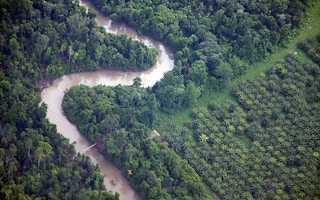Indonesian President Joko Widodo has signed a moratorium on new licenses for oil palm plantations.
The presidential instruction, signed on Sept. 19, will remain in place for no more than three years, according to the policy document, seen by Mongabay.
Environmentalists previously called on Jokowi to impose no limit on the duration of the moratorium, arguing it should remain in place until it achieves its goals.
The policy appears to constitute a freeze on the entire licensing process for oil palm plantations in Indonesia, the world’s top producer of palm oil, a ubiquitous commodity found in everything from chocolate to laundry detergent.
It explicitly applies not just to new requests for licenses but also to projects that have obtained some but not all of the permits needed to begin operating.
The signing of the policy comes more than two years after President Jokowi, as he is popularly known, declared he would impose it.
Jokowi made the announcement in the wake of the 2015 fire and haze crisis, in which vast stretches of swampy peatland that had been drained and dried by the plantation sector burned for months, blanketing Indonesia and its neighbors in choking haze.
In the past two years, the Indonesian Ministry of Environment and Forestry has released several tracts of land from the country’s “forest zone” to oil palm companies. Most recently, dozens of square kilometers were handed to PT Sawit Makmur Abadi, a plantation company operating in the Nabire district of Papua province that has been linked to current and former senior police officials.
At the same time, the land released for oil palm under the current administration pales in comparison to the enormous area that was rezoned during the tenure of President Susilo Bambang Yudhoyono, who served from 2004-2014.
The policy constitutes not just a freeze on new licenses, but an order for the relevant central government ministries and regional governments to conduct a massive review of oil palm licensing data.
The review is to be presided over by the Coordinating Ministry for Economic Affairs, which is supposed to report to the president every six months on the progress of the initiative.
The Indonesian Forum for the Environment (Walhi), the country’s largest environmental NGO, welcomed the issuance of the moratorium but suggested the president should have signed it much earlier.
Ideally, Walhi said in a statement, the moratorium would stay in place for 25 years, because “environmental recovery takes a long time.”
Indonesia has one of the world’s highest deforestation rates, in large part due to uncontrolled expansion by the plantation industry. This has made the country of 250 million people a top greenhouse gas emitter.
Corruption in the issuance of licenses for plantations is rife. Mines too; Indonesia is a top coal producer. When the president announced the moratorium on new oil palm licenses two years ago, he also said he would impose a moratorium on new coal mines, but this has yet to be implemented.
Christian Purba, chairman of the executive board of Forest Watch Indonesia (FWI), an NGO, called the issuance of the moratorium a “good step,” although he thought it was lacking in some respects.
One of these is law enforcement, he said. The policy makes no mention of Indonesia’s anti-graft agency or the police.
“However, the moratorium as a presidential instruction will serve as a legal basis for rejecting any applications for new licenses from palm oil companies,” he told Mongabay.
Christian called for data gathered under the permit review to be made available for public review. FWI is currently fighting the agrarian ministry over a Supreme Court order for it to release right-to-cultivate permits for plantation and farming businesses, known as HGUs, something the ministry has refused to do.
A PDF of the order enshrining the moratorium can be downloaded here.
This article was originally published on Mongabay.com.










